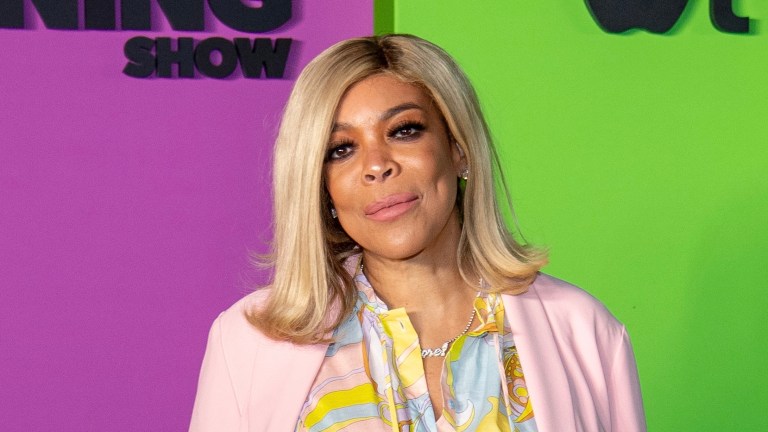Multiple producers of Lifetime’s ‘Where Is Wendy Williams?’ documentary are now speaking out amid criticism of the project. As The Shade Room previously reported, the two-part series aired on Saturday, February 24.
It showcased intimate details of Wendy Williams’ life, including her declining health, alcohol addiction, and guardianship.
RELATED: What’s Really Going On!? Here’s What We Learned From Wendy Williams’ Documentary
Here’s What The Producers Of ‘Where Is Wendy Williams?’ Revealed
‘Where Is Wendy Williams?’ producer Mark Ford sat down for an exclusive interview with The Hollywood Reporter, which was published on Tuesday, February 27.
Earlier on in the article, it’s noted that “at a certain point,” producers were allegedly “more worried about what would happen” if they “stopped filming” than if they continued.
The interview also features the perspectives of fellow producers Erica Hanson and Brie Miranda Bryant. Both appear to confirm that there were moments they felt it “neither appropriate nor safe to keep filming.” However, they hoped the film would serve a “larger purpose.”
“It was supposed to be a documentary that would follow her journey back into her career doing a podcast,” Ford reportedly explained. “We thought it was a great idea, and we were hopeful that Wendy’s story would be redeeming and we’d be able to document this journey. But as we filmed, it became evident that this wasn’t really going to be a career comeback story, that this was going to be a deeper story, and that there was something ultimately disturbing going on in Wendy’s life.”
According to Ford, producers were assured that Williams’ battle with alcohol addiction would “in no way inhibit” their filming plans. However, another diagnosis that Williams would receive would present another obstacle.
“…There were conversations and plans for the podcast, and there were people being put in place to produce that podcast, and that was a storyline that we were following,” he continued. “But it was derailed because of what we now know was the state of Wendy’s dementia.”
The Group Appear To Share The Same Concern As Fans & Viewers
From there, a series of “erratic” interviews Williams reportedly took part in ahead of the documentary’s filming in August 2022 was mentioned. The group was asked to share how, in light of those appearances, they determined that Williams “could be ready for a comeback.”
“It was tough every single day, and there were conversations that we had, all of us, throughout the documentary. And there was no guarantee we would air this documentary if we weren’t happy with the content that we ultimately got and the editorial direction that we landed upon, which was the family’s point of view and illustrating what can happen when one of your family members is put into a guardianship outside of your control,” Ford explained. “We just happened to be there every day seeing the reality of this situation, and we just put the camera on it and captured it. There was no intention.”
Ford explained that the documentary team remained “transparent” about their “producers’ confusion.”
“We’re asking all of these questions that everyone has all the way through. We don’t know this manager. It’s a new manager. We don’t know this publicist. It’s a new publicist. The guardian won’t speak to us. And so we’re constantly just trying to push forward and get the information as filmmakers,” he continued. “Like, what is actually going on here? And by the way, Wendy loved it when the cameras came to the door, it gave her a reason to get up in the morning. I think you see that.”
As mentioned earlier, Ford explained that the team was concerned about what would happen to Williams if they stopped filming. Additionally, in light of Williams’ recent diagnosis of dementia and aphasia, Ford and his team felt they had a duty to share a “universal” story.
“…That discovery came much later in the process, how universal this story is and how many thousands of families in America are going through this exact same thing, except they’re not related to Wendy Williams, who has this massive platform,” Ford shared. “So, of course, we’re human beings. There were incredibly bad days, and there’s a lot of footage we shot that no one will ever see. But we felt like it was important to illustrate the difficult process that Wendy and her family were going through, and frankly, what can happen to someone if they’re under the care of a guardian.”
The Producers Spoke On Wendy Williams’ Guardian & The TV Host’s Current Location
Hanson explained that Williams’ guardian, Sabrina Morrissey, wouldn’t often take the documentary teams’ calls. Additionally, whenever they did, the exchanges were unpleasant or a “terse hang-up.”
Most of their communication with Williams’ guardian reportedly ran through the 59-year-old’s manager, Will Selby. However, the team maintains that the guardian was made aware of every step taken in and for the documentary.
Additionally, the team explained that Williams is an executive producer of the project. However, this agreement was a “precedent” set “with all of her projects at Lifetime.”
To date, Wendy Williams — who is reportedly at an undisclosed facility — has yet to view the four-hour documentary for herself.
“We simply have had no way to get it to her to see it. No way to screen it with her, because she’s locked down in a facility and we haven’t been able to speak to her since we wrapped filming,” Ford explained. “The last day that you see us filming with her is the last time we spoke to Wendy. But we had many conversations behind the scenes with Wendy and Will about what they wanted to film, and what they wouldn’t want to capture.”
Before concluding, Ford maintained that the filming crew’s experience was “unsettling,” with Williams allegedly often being “left alone without food” and in an apartment where she could accidentally injure herself.
“There was no one there 24/7. So, these are just all the questions we had throughout,” Ford said. “But, of course, if we had known that Wendy had dementia going into it, no one would’ve rolled a camera.”


